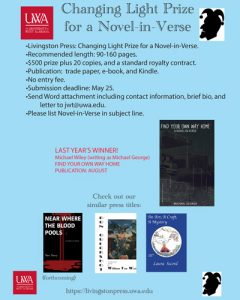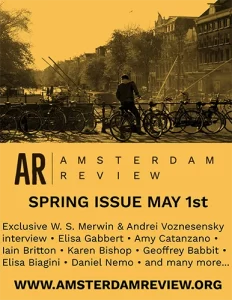The Gettysburg Review – Summer 2011
Volume 24 Number 2
Summer 2011
Quarterly
Charles H. Davenport
On its homepage, the editors of The Gettysburg Review proclaim an unwavering commitment to literary excellence and “emotionally stimulating” art. This issue of the quarterly journal certainly attests to that commitment, making it easy to see why the editors have earned many awards over the past several years. With so much that is good, choosing which pieces and which writers to highlight is a challenge.
On its homepage, the editors of The Gettysburg Review proclaim an unwavering commitment to literary excellence and “emotionally stimulating” art. This issue of the quarterly journal certainly attests to that commitment, making it easy to see why the editors have earned many awards over the past several years. With so much that is good, choosing which pieces and which writers to highlight is a challenge.
Two short stories, “Civil Twilight” by Timothy Hedges and “Buddha Jumps Over the Wall” by Sukhee Ryu, are especially moving. The settings for both stories feature urban landscapes inhabited almost exclusively by the socially marginalized—the dregs of Detroit and the seemingly sequestered inhabitants of “Koreatown” in Los Angeles—and both authors infuse their writing with such exquisitely detailed scenery that readers can be forgiven for mistaking these pieces as memoirs rather than fiction. The narrator in “Civil Twilight” is Augie Salvatore, a Detroit bus driver whose father, Mayo, is a retired bus driver dying in an unglamorous city hospital. While Augie navigates the same littered streets his father did, he struggles to reconcile the impending loss of his father with the reality of his own life, which mirrors that of his father’s. But the city Hedges paints is not one filled with hopelessness, rather it is one whose residents are entrenched in a battle for dignity and self-worth.
While Hedges covers the span of just one bus ride, Sukhee Ryu’s story encompasses nearly the entire life of her protagonist, whose name we never know. Ryu begins her tale: “What I am going to tell you concerns a woman. Of this woman’s life I know nothing certain, and what I do remember about her is scant enough to be recorded in its entirety in just a few pages.” True, but the story is really about the narrator who learns to appreciate the most basic elements of his native Korea, especially the soup, “Buddha Jumps Over the Wall,” from which the story derives its title. Living mostly alone and losing his life savings in an investment scam, the narrator finds comfort in a few brief glimpses of a waitress and the simplicity of soup.
The Gettysburg Review also presents powerful pieces by a number of notable poets. Among them are David Wagoner and Rebecca Hazelton. In his poem, “Taking Leave of My Senses,” Wagoner says goodbye to the one who taught him how to see, touch, hear, taste and smell, and he does so “one ganglion at a time.” He wonders, now that this friend is gone, what he will do, realizing he may not be far behind:
…so what on earth
am I going to do now? Here’s mud in your eye
and mine and in our ears and on our tongue
and up our nose and under these fingertips.
In her poem, “Elise as Marie Antoinette at Her Toilette,” poet Rebecca Hazelton begins with a confession: “I dream of a disco heaven.” And, in her heaven, “the prettiest boys are sodomatic in the strobe […] and the record never skips.” But, she reminds us, society (real life?) is never free of the machinations of gender:
It’s always the same
yellow fluff
that molts into a mother,
then gets its head cut off
when the pearls cease
to descend in an ordered string.
In the end, Hazelton returns to her dream, her longing to free her body of its societal confines, and she would do it “for the crowd’s love—my unwashed darlings / who could think for a moment I’d deny / you bread, cake, or anything.”
The essays in this issue are outstanding. In “Bad Birds,” John Nelson makes the case that birds have not always had it so easy in America. While we may now sing the praises of the bald eagle, the sparrow, warblers, and many others, it wasn’t always this way. In fact, Nelson explains, the promiscuity of many birds was once considered an abomination, an actual sin. Even the dining manners of such highly revered birds as the bald eagle were once compared to those of a tyrant, because only a tyrant would kill harmless animals or eat carrion. But Nelson is making the much larger point that if it is foolish to apply human moral standards to birds, then “it is even more nonsensical to justify any human behavior on the grounds that, like the birds and beasts, we are destined to rob, cheat, rape, or go to war over vital resources.”
The Summer 2011 issue of The Gettysburg Review is filled with too much good writing to do it justice here. The editors certainly deliver on their promise.
[www.gettysburgreview.com]




